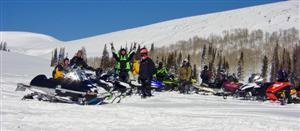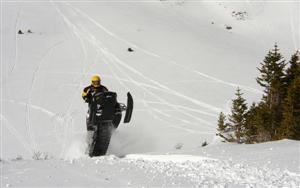June 2007
- Performance Zone
POWER UP YOUR 12.7 DETROIT
By Performance Specialist Bruce C. Mallinson
Did you ever think that a 12.7 liter Detroit Diesel 60 Series could produce 690 horsepower? I must admit that prior to working on these little engines I did not think there was much hope for them. In fact, I could not believe that any owner-operator in their right mind would buy a 12.7 liter engine when he/she could have a 15 liter Caterpillar or Cummins engine. Wow, was I wrong!
When we started testing a 12.7 Detroit-powered truck on the dyno with a Pittsburgh Power Performance Computer installed, the power just kept climbing – the more we added, the better she cranked. We wanted to use the same remote control we use on the Dodge Cummins 5.9 engine, which has 9 power settings, thinking we would block off the number 8 and 9 settings because we did not think that the engine would continue to produce horsepower. Wrong again. This little Detroit just kept cranking out the rear wheel horsepower, so we left the remote as it was with 9 power settings – each one producing an additional 20 to 25 rear wheel horsepower and about 75 foot pounds of torque. Then we figured out how to increase the flow to the Detroit injectors and the little engine continued to produce more horsepower. But were we finished making power yet? Absolutely not! In addition to the upgraded computer and increased fuel flow, the ECM was also modified to produce 10% more horsepower and 2400 rpm.
I just spoke with Lavern Cross of Middlebury, Indiana. Lavern is the owner of one of these special little 12.7 liter Detroits. I asked him if he has ever put the Pittsburgh Power Computer on power setting 9 and, at 1800 rpm, stood on the throttle and ran the engine up to 2400 rpm just to feel what it is like? His reply, “Heavens no, I built this old A-Model Kenworth and I baby her! I know she runs like a 427-powered 1967 Corvette, however I’ll never use all of the power I have.” Yes, it’s amazing what these little engines can do with fuel and air. We also coated his pistons with ceramic and teflon for smoother riding in the cylinder bore.
Another owner-operator by the name of Marvin Gerbrand out of Missouri just had his DD3 Detroit built using our injectors and a Pittsburgh Power Computer (we did not rework his ECM) and he was shocked at the performance. On power level 4, his Detroit produces 46 lbs. of turbo boost, which is around 690 horsepower. Marvin told me that he went out to pass another vehicle and just pushed down on the throttle like he always did with his old engine. When he thought he was going about 70 mph, he looked at the speedometer – it was showing 85 mph – and he had a gross weight of 79,000 lbs. Yes, these engines can run when there is plenty of fuel and air available. By the way, Marvin estimates that with the excessive power he now has available he is saving about $300 per week in diesel fuel. At that rate, he will pay for his engine rebuild in about seven months.
 Do
you still think high horsepower means low fuel mileage? An owner-operator
came to our shop a while back to purchase a set of our straight-through
quiet mufflers for his 550 Cat. Well, the mufflers worked so well, we
had the pleasure of rebuilding his engine when it finally wore out at
966,000 miles – and the owner, Tom Baslik, went all the way. We fitted
his engine with a Pittsburgh Power Computer, a Holset Turbo, a mercury-filled
balancer and crank damper, and anything else we had that would improve
power and longevity. Leased to Tom Sunday out of New Kingstown, Pennsylvania,
Tom pulls an enclosed car transporter which holds six vehicles. On a recent
trip coming out of California, grossing 78,000 lbs. and averaging 62 mph
(which means he was running around 70 mph), his 1996 Pete gave him 6.8
miles per gallon. Tom’s 5EK Cat produces so much power that he never feels
the floorboard with his right foot. His overall average is 6 plus miles
per gallon. Excessive power, when properly used, will always get great
fuel mileage. You can call Tom for yourself on his cell phone at 410-456-2158
to discuss just how well his truck runs today.
Do
you still think high horsepower means low fuel mileage? An owner-operator
came to our shop a while back to purchase a set of our straight-through
quiet mufflers for his 550 Cat. Well, the mufflers worked so well, we
had the pleasure of rebuilding his engine when it finally wore out at
966,000 miles – and the owner, Tom Baslik, went all the way. We fitted
his engine with a Pittsburgh Power Computer, a Holset Turbo, a mercury-filled
balancer and crank damper, and anything else we had that would improve
power and longevity. Leased to Tom Sunday out of New Kingstown, Pennsylvania,
Tom pulls an enclosed car transporter which holds six vehicles. On a recent
trip coming out of California, grossing 78,000 lbs. and averaging 62 mph
(which means he was running around 70 mph), his 1996 Pete gave him 6.8
miles per gallon. Tom’s 5EK Cat produces so much power that he never feels
the floorboard with his right foot. His overall average is 6 plus miles
per gallon. Excessive power, when properly used, will always get great
fuel mileage. You can call Tom for yourself on his cell phone at 410-456-2158
to discuss just how well his truck runs today.
The owner operator Snowmobile Conference took place this past March in Heber City, Utah. All in attendance had a great time and we are going to do this again next winter in Utah or Colorado. Our group leader Sherman Zeeman just retired after 52 years of accident-free driving as a heavy hauler. Sherman recently had a hip replaced and will be ready to snowmobile next winter. This guy was a great owner-operator and is still a fantastic snowmobiler. And after 47 years of riding sleds, he still loves the sport. If you’re an owner-operator, mechanic, or involved in the trucking industry in any way and you’re a sled head, plan to join us in 2008 for a great week of snowmobiling and talking trucks and sleds!
By the way, if you are interested, Sherman’s equipment is now up for sale. He has a 1988 Peterbilt that he repowered with a 5EK 550 Caterpillar engine, 15-speed transmission, 2-speed rears, a Pittsburgh Power Computer, new power steering and new wheels and tires (steer). This nice 4-axle tractor has many more options. The trailer is a 1991 Murray 3-axle with a Peerless booster axle. Together, this combination has 8-axles and weighs 42,000 lbs. empty. He also has an A-Model KW with a 2-stick transmission, SSHD 44,000 bogies and no engine (it was set up for a KTA Cummins). This 1975 truck was the second Kenworth to be built as a double bunk. In fact, it was the first Kenworth released to the public with a double bunk – the first one was the Sonny Pruitt truck I mentioned last month for the television show “Movin’ On” which aired in the mid-1970s. Sherman can be reached at 801-465-2736 if you are interested in any of his equipment. He lives right next to the Flying J Truck Stop in Payson, Utah (just off I-15). If you go see him, be sure to look at his picture albums which feature photos of the many heavy hauls he has pulled during his 72 years of life.
Copyright
© 2007 10-4 Magazine and Tenfourmagazine.com
PO Box 7377 Huntington Beach, CA, 92615 tel. (714) 378-9990 fax
(714) 962-8506

